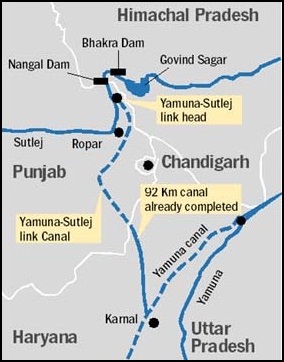Governance
Sutlej-Yamuna Link Canal Project
- 20 Aug 2020
- 6 min read
Why in News
Recently, the Chief Minister of Punjab has warned the Centre of political unrest in the state if asked to proceed with the Sutlej-Yamuna Link (SYL) canal project.
- Punjab has staked claims to Yamuna’s waters and also reiterated the need for a tribunal on water sharing.
Key Points
- Background:
- 1960: The dispute can be traced back to the Indus Water Treaty between India and Pakistan, allowing the former ‘free and unrestricted use’ of Ravi, Beas and Sutlej.
- 1966: Creation of Haryana from the old (undivided) Punjab presented the problem of giving Haryana its share of river waters.
- For Haryana to get its share of the waters of the Sutlej and its tributary Beas, a canal linking the Sutlej with the Yamuna was planned (SYL Canal).
- Punjab refused to share waters with Haryana stating it was against the riparian principle which dictates that the water of a river belongs only to the State and country or States and countries through which the river in question flows.
- 1981: Both states mutually agreed for the re-allocation of water.
- 1982: Construction of 214-km SYL was launched in Kapoori village, Punjab.
- Agitations, protests and assassinations were carried out in protest creating the environment of terrorism in the state and making the issue of national security.
- 1996: Haryana moved the Supreme Court (SC) seeking directions to Punjab to complete the work on the SYL.
- 2002 and 2004: SC directed Punjab to complete the work in its territory.
- 2004: Punjab Assembly passed the Punjab Termination of Agreements Act, terminating its water-sharing agreements and thus jeopardising the construction of SYL in Punjab.
- 2016: SC started hearings into a presidential reference (Article 143) to decide on the legality of the 2004 Act and declared that Punjab reneged on its promise to share the waters of rivers. Thus, the act was termed constitutionally invalid.
- 2020:
- SC has directed the Chief Ministers of both states to negotiate and settle the SYL canal issue at the highest political level to be mediated by the Centre.
- Punjab has asked for a tribunal for fresh time-bound assessment of the water availability.
- Punjab holds that there has been no adjudication or scientific assessment of river waters in the state till date.
- The availability of Ravi-Beas water has also come down from the estimated 17.17 MAF in 1981 to 13.38 MAF in 2013. A fresh tribunal would ascertain all this.
- Reasons for Punjab’s Unwillingness:
- Punjab is facing severe water crisis due to over-exploitation of its underground aquifers for the wheat/paddy monocycle.
- According to the Central Ground Water Authority’s report, its underground water is over-exploited in about 79% of the state.
- Punjab feels that it has utilised its precious groundwater resources to grow the crop for the entire country and should not be forced to share its waters as it faces the threat of desertification.
- Also, the youth of the state may start feeling that the state has been discriminated against once the construction of the canal restarts.
- Pakistan and secessionist organisations like Sikh For Justice could exploit the situation to foment trouble in the state.
- Punjab is facing severe water crisis due to over-exploitation of its underground aquifers for the wheat/paddy monocycle.
Article 143: Advisory Jurisdiction
- The Constitution under Article 143 authorises the President to seek the opinion of the Supreme Court in the two categories of matters:
- On any question of law or fact of public importance which has arisen or which is likely to arise. The SC may tender or may refuse to tender its opinion to the President.
- On any dispute arising out of any pre-constitution treaty, agreement, covenant, engagement, sanador other similar instruments. Here, the SC must tender its opinion to the President.
- In both the cases, the opinion expressed by the Supreme Court is only advisory and not a judicial pronouncement. Hence, it is not binding on the President.
- The references made by the President under Article 143 are decided by a Bench consisting of at least five judges.
- Few important references made by the President to the SC under its advisory jurisdiction are:
- Berubari Union, 1960.
- Cauvery Water Disputes Tribunal, 1992.
- Rama Janma Bhumi case, 1993.
- Punjab Termination of Agreements Act, 2004.
- 2G spectrum case verdict and the mandatory auctioning of natural resources across all sectors, 2012.
Way Forward
- Punjab needs to understand the importance of the canal for Haryana and should rethink its previous stands. Adequate measures should be put in place before any new decision to keep the possible political turmoil in control. Neighbouring states and centre will have to play a crucial role.
- It’s time for the Centre to chart a new course centred on Punjab’s demand for a fresh tribunal for the division of the river waters. For that, it’s imperative that all stakeholders stop further complicating the situation.







